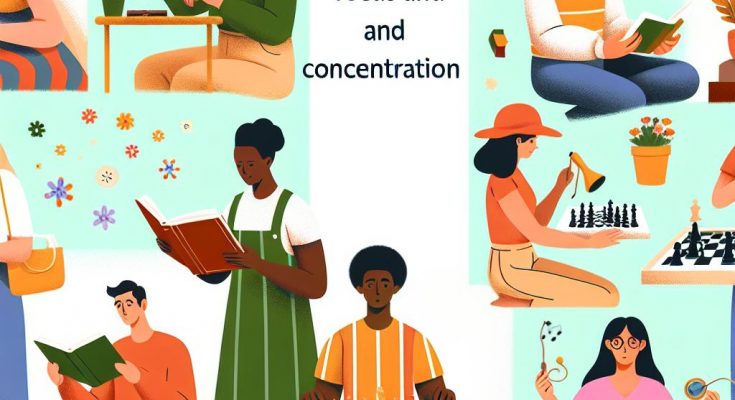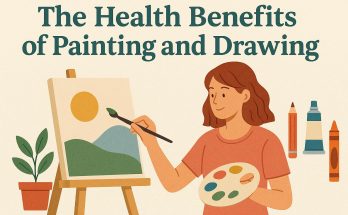Introduction
In today’s fast-paced world, maintaining focus and concentration can be challenging. Numerous distractions abound, making it difficult for individuals to maintain the mental clarity needed for various tasks. Engaging in certain hobbies can be an effective way to enhance these cognitive abilities. This article explores a range of hobbies that are known to improve focus and concentration.
Chess
Playing chess is more than just a pastime; it’s a strategic game that involves critical thinking and planning. Chess requires players to anticipate their opponent’s moves while strategizing their own. This promotes mental exercise and enhances concentration. The game of chess engages the mind continuously, demanding that each move be calculated and purposeful. Here’s how chess benefits cognitive functions:
Improved Problem-Solving Skills: Chess aids in the development of problem-solving abilities. Players must continuously tackle complex positions and strategize effectively to outmaneuver their opponents. This requires analyzing various outcomes, an activity that significantly sharpens the mind over time.
Enhanced Memory: As players become more familiar with numerous openings, tactics, and opponent strategies, their memory capacity sees an upgrade. Remembering past games, successful strategies, and common mistakes refines their ability to retain and apply information efficiently.
Increased Patience: Patience is integral to chess. Players learn to contemplate each move, recognizing that impulsivity rarely aligns with successful gameplay. By fostering patience, individuals enhance their ability to maintain sustained attention in other areas of life.
Reading
Engaging in reading can be a powerful way to improve focus and concentration. When reading, the brain is actively involved in processing information, understanding contexts, and remembering details. Reading regularly can help enhance one’s ability to focus for extended periods. Here are ways in which reading aids cognitive development:
Vocabulary Expansion: As individuals encounter new words, their vocabulary naturally expands. This not only improves language skills but also boosts cognitive development, allowing for better communication and comprehension skills.
Strengthened Analytical Thinking: Reading prompts individuals to critically analyze the information, form opinions, and make connections between different pieces of information. This process enhances analytical thinking capabilities.
Longer Attention Span: Consistent reading practice helps in lengthening attention span. It requires individuals to operate in a distraction-free environment, increasing their ability to concentrate on tasks in other areas of life.
Meditation and Mindfulness
Both meditation and mindfulness practices are widely recognized for their ability to increase focus and concentration. Through regular practice, individuals can learn to better control their thoughts and maintain mental clarity. These practices encourage the mind to stay present, which reduces distractions and improves cognitive control. Below are some benefits:
Reduction of Anxiety: Meditation reduces anxiety levels by helping individuals manage their thoughts more effectively. This decrease in anxiety enables better focus and concentration throughout daily activities.
Improvement in Mental Clarity: Regular meditation and mindfulness practice enhances mental clarity, allowing for more thoughtful decision-making and problem-solving. A clear mind can sift through distractions better, ensuring a focused approach to tasks.
Enhanced Emotional Stability: Meditation facilitates emotional regulation, encouraging individuals to be more mindful of emotional responses. Emotional stability aids in maintaining concentration in potentially stressful situations.
Music and Musical Instruments
Listening to music or learning to play a musical instrument can aid in concentration improvement. When playing an instrument, one must focus on timing, rhythm, and pitch, all of which demand attention and cognitive engagement. Let’s explore how musical pursuits contribute to cognitive growth:
Auditory Skills Enhancement: Playing music enhances auditory perception. Musicians develop an acute ability to discern subtle differences in tones, which translates to improved listening skills in everyday interactions.
Spatial-Temporal Skills: The act of playing an instrument involves understanding spatial-temporal patterns which are instrumental in disciplines such as mathematics and engineering. This crossover can sharpen skills used in logical and analytical problem-solving.
Memory and Concentration Boost: Music demands memorization of notes and techniques, reinforcing both memory and focus. Regular practice leads to improved attention span and the ability to concentrate on intricate tasks for longer periods.
Yoga
Yoga combines physical postures, breathing techniques, and meditation to promote mental clarity. It helps individuals develop better concentration by teaching techniques to focus the mind and reduce stress. Here are the cognitive benefits of yoga:
Improved Cognitive Flexibility: Yoga promotes flexibility not just of the body but also of the mind. It aids in adapting to new tasks and contexts with ease, increasing mental agility and responsiveness.
Stress Reduction: Yoga encourages relaxation and stress reduction, creating a calmer mind, more adept at sustaining attention and processing information efficiently.
Boosted Memory and Focus: By focusing on breath and movement, yoga practitioners learn to concentrate and maintain focus, leading to improved memory retention and mental clarity.
Drawing and Painting
Engaging in artistic activities such as drawing and painting can significantly enhance concentration. These activities require a keen attention to detail and an understanding of spatial relationships and color coordination. Here’s why artistic endeavors are beneficial:
Fine Motor Skills Development: The process of creating art requires precise movements that enhance fine motor skills. The focus needed for artistic detailing reflects improved concentration abilities.
Enhanced Problem Solving: Art projects often require problem-solving skills, whether determining how to achieve the right shade or correcting an error on a canvas. This increases cognitive abilities and adaptability.
Total Immersion: Artistic activities provide a space for total immersion, where one can work free of distractions. This deep focus can enhance overall concentration and provide a meditative-like experience.
Conclusion
Incorporating hobbies that stimulate the mind and require focused attention can positively impact one’s ability to concentrate and maintain focus. Whether it’s through strategic games like chess, the meditative qualities of yoga, or the creative process involved in art, these activities provide valuable opportunities to improve cognitive functions while enjoying the process of learning and engagement. By selecting hobbies that resonate personally, individuals can not only enhance their cognitive capacities but also find meaningful ways to unwind and rejuvenate mentally.





